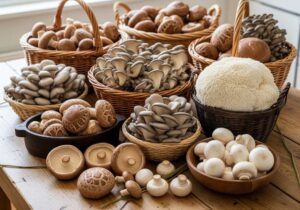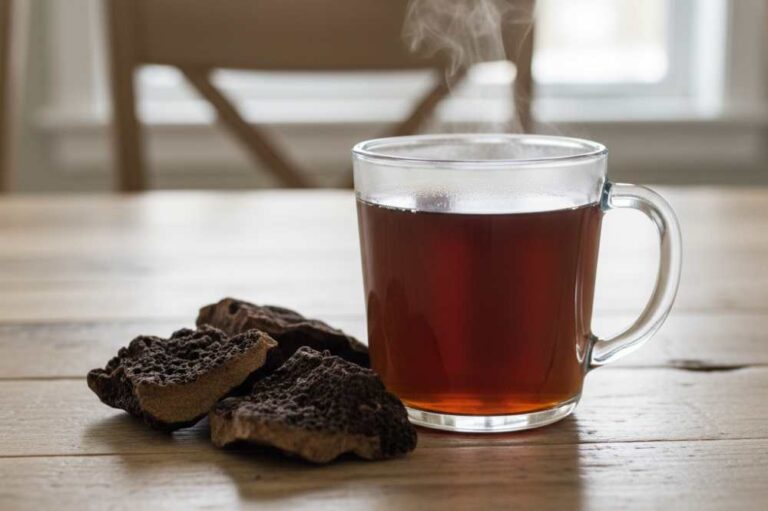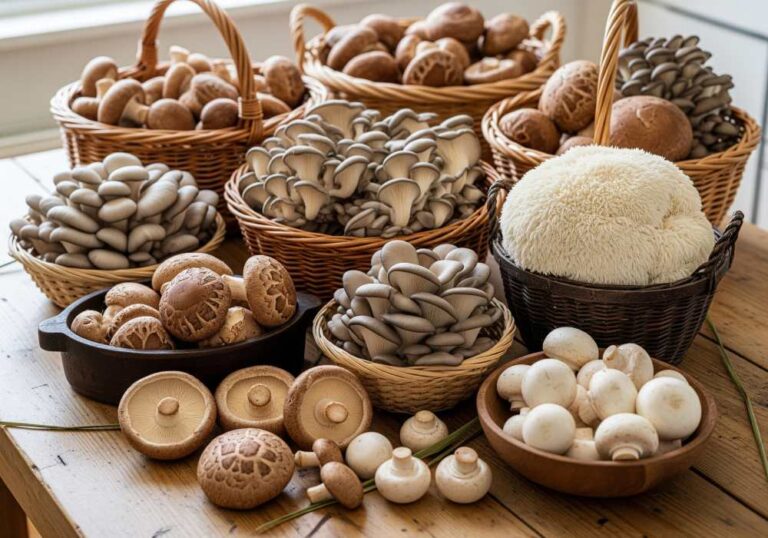If you’re pregnant and staring at that packet of mushroom coffee on your kitchen counter, here’s a short advice: it’s not the safest choice.
Yes, some studies on whole mushrooms show benefits like lowering blood pressure in expectant mothers, but that’s not the same thing as sipping an instant powder that mixes coffee with potent extracts.
If you’re pregnant, it’s best to treat mushroom coffee as an occasional indulgence at most – and only after talking it through with your healthcare provider. If you want the earthy flavor of mushrooms without the caffeine or extract risk, cook with fresh mushrooms instead. That way, you enjoy their natural antioxidants and beta-glucans without the uncertainty that comes with concentrated powders.
Disclaimer: The information provided in this article is for educational and informational purposes only and is not intended as medical advice. Always consult a qualified healthcare provider before making changes to your diet, especially during pregnancy.
Mushroom Coffee and It’s Issue
This drink offers a potential nutritional boost beyond the caffeine kick by blending ground coffee beans with powdered medicinal mushrooms like Lion’s Mane, Reishi, and Chaga.
These functional mushrooms are celebrated for their antioxidant, anti-inflammatory, and immune-modulating properties.
The coffee component provides energy and focus, and the mushroom addition aims to enhance cognitive function, support well-being and offer additional health benefits.
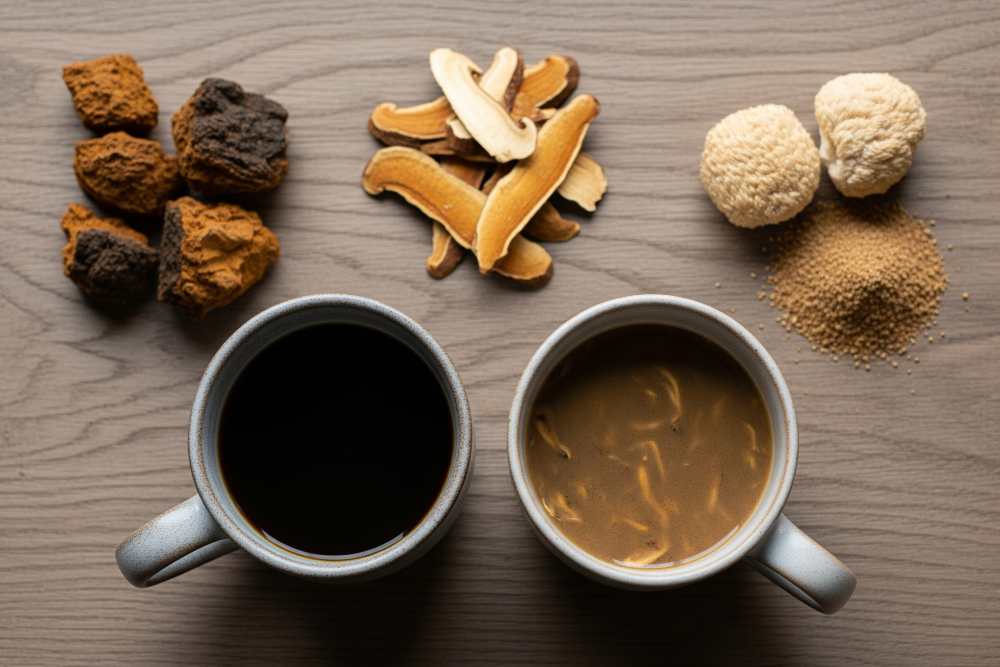
The caffeine content in mushroom coffee can be very unpredictable. Some brands cut their caffeine in half compared to regular coffee, while others are almost identical to a normal cup. And very few tell you exactly how concentrated their mushroom extracts are – which is concerning if you’re pregnant and need to monitor every milligram that enters your body.
So when people say, “Oh, mushroom coffee is healthier than regular coffee,” I always raise an eyebrow. Healthier in what sense? Less caffeine? Sure, sometimes. Added polysaccharides and adaptogens? Possibly. But “healthier” doesn’t equal “safe for pregnancy.”
Pregnancy Physiology That Changes the Rules
Everything from your hormones to your liver enzymes is working differently – and that changes how substances like caffeine or mushroom extracts behave.
Here’s what makes pregnancy unique when it comes to drinking coffee or mushroom coffee:
- Normally, your liver enzymes break down caffeine fairly quickly. But during pregnancy, caffeine’s half-life nearly doubles, which means it stays in your system much longer than it used to. For the fetus, it’s even more concerning – their immature liver can’t break it down at all. So even small doses build up.1
- Whatever caffeine or bioactive compounds you consume, they cross the placenta and reach the baby’s circulation. There’s no filter strong enough to keep them out.
- Pregnancy changes how your immune system and endocrine system respond to outside compounds. What might act as a mild immune boost for you could play out unpredictably when a developing fetus is involved.
- With increased blood flow, the distribution of active compounds changes. Substances may reach higher concentrations in some tissues than in non-pregnant states.

To me, this is why I find pregnancy nutrition fascinating – the same cup of coffee you enjoyed last year isn’t processed the same way once you’re pregnant.
Benefits of Mushroom Coffee Don’t Outweigh the Risks in Pregnancy
Mushroom coffee gets its hype from the supposed health perks of medicinal mushrooms. Brands love to talk about immune-boosting β-glucans, stress-calming adaptogens, or even cognitive-enhancing lion’s mane compounds. And yes, some of these claims are backed by early studies in adults.
For example:
- Reishi is linked to immune modulation and anti-inflammatory effects.
- Lion’s Mane has shown potential for supporting nerve growth factors and memory in small trials.
- Chaga carries high levels of antioxidants like polyphenols and melanin.
- Cordyceps is often marketed for stamina and respiratory health.
The catch? Almost all of this research is done in non-pregnant adults, sometimes even in lab dishes or animal models. The doses used are standardized and often much higher unlike what you’d casually drink in a coffee blend.
The one human pregnancy study that does exist looked at whole mushrooms as food – about 100 grams daily – and found benefits like reduced pregnancy-induced hypertension and fewer oversized babies.2 That’s encouraging, but again, fresh mushrooms on a dinner plate aren’t the same as concentrated mushroom powders in coffee. Extracts isolate certain bioactives, and that changes how the body responds.
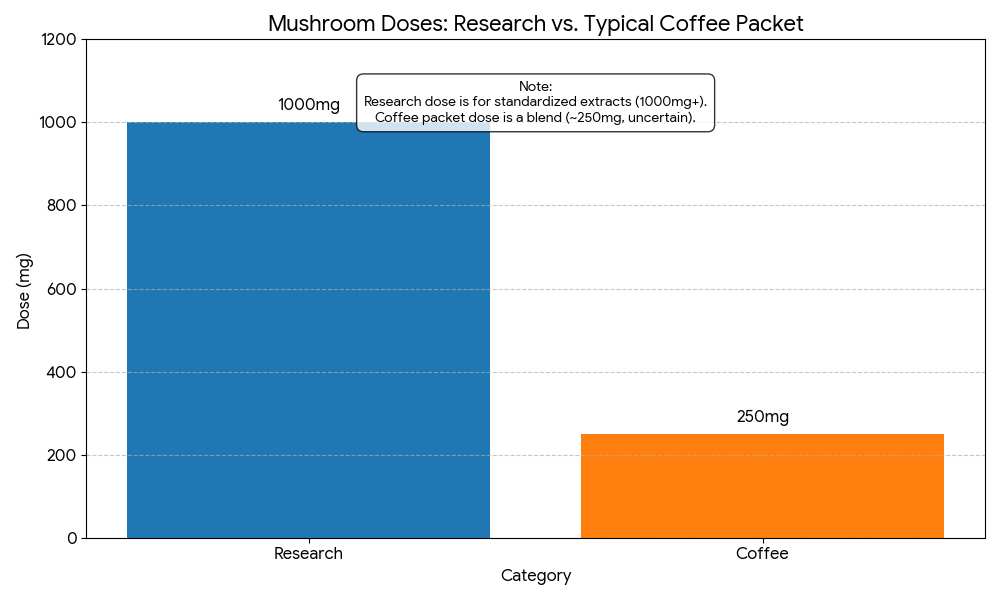
Mushrooms are powerful foods, and yes, their compounds show promise. But pregnancy isn’t the time to experiment with concentrated extracts in a coffee blend. The safest way to get mushroom benefits while expecting? Cook with fresh mushrooms – you’ll still get antioxidants, vitamin D, and ergothioneine without the unknowns.
Is Mushroom Coffee Safe During Pregnancy?
No, mushroom coffee isn’t considered safe during pregnancy.
If someone’s craving the earthy flavor, the safer route is decaf or sticking to fresh culinary mushrooms in food, not mushroom coffee blends.

There are concrete reasons mushroom coffee could be risky in pregnancy:
- Caffeine-related risks: Miscarriage, stillbirth, and low birth weight are the biggest concerns tied to caffeine consumption in pregnancy. This risk doesn’t magically disappear because coffee is mixed with mushrooms.3
- Uncertain extract dosing: Many brands don’t tell you how concentrated their mushroom extracts are. One packet might be mild, another more potent – and you’d never know.
- Bioactive interactions: Compounds like triterpenes and polysaccharides aren’t well studied in pregnancy. They can influence immune function, hormone balance, and even blood clotting – all sensitive systems during gestation.
- Potential contaminants: Wild-harvested mushrooms like chaga may absorb heavy metals from the soil. Without third-party testing, you’re trusting that what’s in the packet is clean.
- Digestive side effects: Some people report nausea, bloating, or allergic reactions to mushroom extracts – symptoms you don’t want complicating pregnancy.
Practical Recommendations For Pregnant Women
Let’s cut through the noise. If you’re pregnant and wondering what to do about mushroom coffee, here’s the advice I’d give a friend:
- Don’t do it unless your doctor tells you to. There just isn’t enough research to call mushroom coffee safe during pregnancy. With caffeine risks well-documented, and mushroom extract data absent, caution wins.
- If you really want the flavor, go caffeine-free. Choose a decaf mushroom coffee or make your own mushroom broth with culinary mushrooms. That way you’re skipping the stimulant while still enjoying the earthy taste.
- Stick to whole foods. Sautéed mushrooms in a stir-fry or soup will give you the antioxidants and polysaccharides naturally, without the unpredictability of extracts.
- If you are somehow consuming it; check your total caffeine intake. Remember that mushroom coffee isn’t caffeine-free unless clearly labeled. If you’re also drinking tea, soda, or chocolate, the numbers add up.
- Bring the label to your prenatal checkup. If you’re still tempted, show your OB-GYN the ingredient list, caffeine content (if listed), and how often you plan to drink it. That conversation will be more valuable than any blog post.
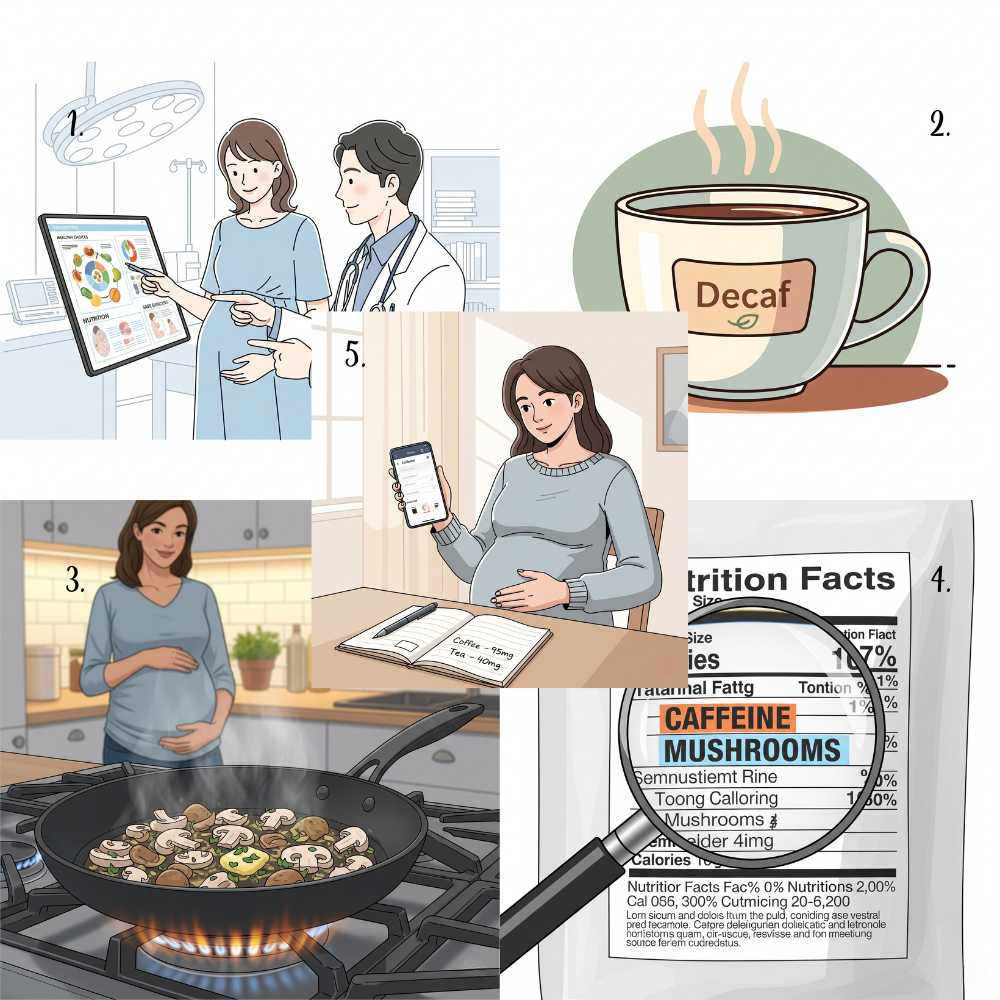
If you’re hesitant or advised against drinking mushroom coffee, consider alternatives like decaffeinated coffee, herbal teas (peppermint or ginger), and plain warm milk (especially if lactose-free). Those are equally comforting without added risks. These also help woman deal with IBS by providing low FODMAP contents.
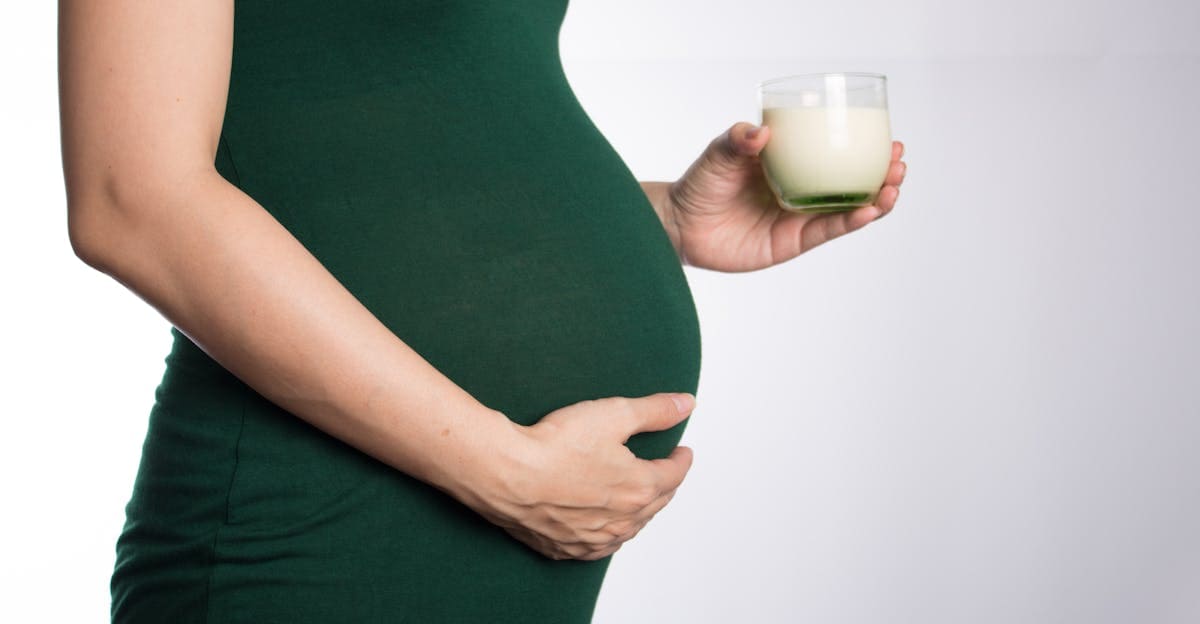
How to Evaluate a Mushroom Coffee Product
If you’re considering one – whether pregnant or not – here’s what you should look for on the label:
- Caffeine content per serving: Transparent brands will list the milligrams. Reduced caffeine means nothing if they don’t give numbers.
- Exact mushroom species: Look for Latin names like Ganoderma lucidum (reishi) or Hericium erinaceus (lion’s mane). Generic “mushroom powder” is a red flag.
- Extract type and concentration: Does it say “fruiting body 8:1 extract” or just “mycelium powder”? Fruiting body extracts are usually more potent. If there’s no detail, assume it’s low-quality or untested.
- Standardization markers: Good extracts mention β-glucan percentage or triterpene levels. If it’s missing, the potency is anyone’s guess.
- Third-party testing: Look for seals that confirm purity and heavy-metal screening – especially important with wild-harvested chaga or reishi.
- Pregnancy/lactation warnings: Some honest brands include disclaimers like “Not recommended during pregnancy.” If that’s there, take it seriously.
Final Thought
Mushroom coffee may be tempting during pregnancy due to its lower caffeine content and potential benefits. Still, the lack of proven knowledge and potential risks call for caution. Always prioritize safety and well-being for both you and your baby.
Resources:
- Román-Gálvez, M., Martín-Peláez, S., Hernández-Martínez, L., Cano-Ibáñez, N., Olmedo-Requena, R., Martínez-Galiano, J., Bueno-Cavanillas, A., & Amezcua-Prieto, C. (2022). Caffeine Intake throughout Pregnancy, and Factors Associated with Non-Compliance with Recommendations: A Cohort Study. Nutrients, 14(24), 5384. https://doi.org/10.3390/nu14245384 ↩︎
- Sun, L., & Niu, Z. (2020). A mushroom diet reduced the risk of pregnancy-induced hypertension and macrosomia: a randomized clinical trial. Food & Nutrition Research, 64(0). https://doi.org/10.29219/fnr.v64.4451 ↩︎
- James, J. E. (2020). Maternal caffeine consumption and pregnancy outcomes: a narrative review with implications for advice to mothers and mothers-to-be. BMJ Evidence-based Medicine, 26(3), 114–115. https://doi.org/10.1136/bmjebm-2020-111432 ↩︎
Frequently Asked Questions
Are mushroom powders safe during pregnancy?
Not really. Culinary mushroom powders (like ground shiitake or button mushrooms) used in cooking are generally fine. But concentrated medicinal mushroom powders (reishi, chaga, lion’s mane, cordyceps) haven’t been tested for pregnancy safety. Without solid data, it’s best to avoid them.
Can you drink matcha while pregnant?
Yes, in moderation. Matcha is high in antioxidants but still contains caffeine (about 60–70 mg per cup). Keep your total daily caffeine under 200 mg if your doctor allows.
What teas should I avoid while pregnant?
Skip herbal teas with unclear safety data or known risks: licorice root, sage, comfrey, pennyroyal, and some detox blends. Stick to pregnancy-safe options like ginger, peppermint, rooibos, or chamomile (in moderation).
Who should avoid drinking mushroom coffee?
Pregnant women, breastfeeding mothers, people with autoimmune disorders, bleeding disorders, or those on immunosuppressant or anticoagulant medications should steer clear. Safety is unproven for these groups.
What’s the best time to drink mushroom coffee?
If you’re not pregnant and are cleared to drink it, morning is best. It still contains caffeine, so drinking it late in the day may disrupt sleep.




